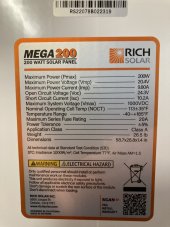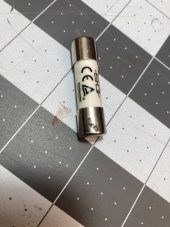UGT
New Member
My system has been up and running for a few months with no problems. Noticed this morning that the controller does not show any input from the panels on the roof. From the on/off switch I took the two -/+ leads coming down from the roof from the panels and tested and only showed 2.3v. Should be at least 24+v. Don't know what has happened but am thinking there's something wrong on the roof.
My sytem is eight 200 watt RichSolar panels on the roof parallel and series connected to my 60amp RichSolar controller to my three 24 volt 200 amp LiTime batteries with 3000 watt inverter. I tested my volt meter with the batteries and showed correctly 26.4 volts just to make sure my meter is working. Stumped. System has been producing regularly 1400 to 1500 watts daily from the panels keeping the batteries charged to 28.6 volts.
We have had some rain last few days but nothing torrential, no high winds, no hail, some distant lightning nothing close to speak of. But have had the same weather off and on last couple months and created no problems.
Can a panel just stop working? How to check the panels? They are all mounted fairly close together with about 4 inch clearance from the roof. I put my eyes on them and saw nothing obvious that would cause the problem. Any help would be appreciated. Thanks, George
My sytem is eight 200 watt RichSolar panels on the roof parallel and series connected to my 60amp RichSolar controller to my three 24 volt 200 amp LiTime batteries with 3000 watt inverter. I tested my volt meter with the batteries and showed correctly 26.4 volts just to make sure my meter is working. Stumped. System has been producing regularly 1400 to 1500 watts daily from the panels keeping the batteries charged to 28.6 volts.
We have had some rain last few days but nothing torrential, no high winds, no hail, some distant lightning nothing close to speak of. But have had the same weather off and on last couple months and created no problems.
Can a panel just stop working? How to check the panels? They are all mounted fairly close together with about 4 inch clearance from the roof. I put my eyes on them and saw nothing obvious that would cause the problem. Any help would be appreciated. Thanks, George




